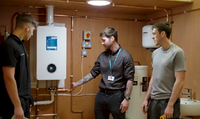Spotlight on EngTech: Lewis Litherland
In our ongoing series of case studies, Jordanne Allsopp, IGEM Marketing Communications Coordinator, chats to our members about their careers to date and how IGEM has supported them so far. This time, she spoke to Lewis Litherland, Sytem Design Engineer at Aira.

After conducting his first lesson as a Lecturer at St Helens College in 2021, Lewis Litherland experienced a profound epiphany. “In that moment,” he reflected, “I realised that the once reserved gas engineer had now transformed into a confident teacher, and I haven’t looked back since.”
Lewis’ career began when he was 17, working as an apprentice at British Gas where he remained for 10 years, taking on various roles including as a Gas Engineer and a Technical Service and Repair Engineer.
He said that moving to teaching was quite a surprise to his friends and family given his introverted personality but he was looking forward to the challenge.
Lewis said: “It was a step out of my comfort zone but it was the best decision I have made in my career.”
His first ever lesson was based on the layout of common heating systems, where he was provided with a 90-minute PowerPoint presentation to go through with his students. He had worked with newly qualified engineers and apprentices when on the tools previously, but had no experience teaching in a formal setting.

Lewis said that his knowledge working as an engineer came pouring out of him for the next 90 minutes and he found himself doing demonstrations with zone valves, pumps, air vents and TRVs to enforce his points.
He said: “I stood up and somehow began to talk about the subject with a confidence I rarely felt in my everyday life, it was almost an out-of-body experience. The students hung onto every word I said and even began to ask me questions as I spoke.”
Since then, Lewis’ teaching skills have gone from strength to strength, and he hopes to contribute to how the curriculum is constructed, delivered and assessed on a national level in the future.
Lewis has recently taken on a role as a system design engineer at Aira, a company which specialises in air source heat pump installations. Day to day, Lewis is designing bespoke heating systems for domestic homes where he performs heat loss calculations, sizes radiators, appliances and pipework for the installation team to move forward.
He explains that designing low temperate heating systems for existing homes can be interesting and challenging at times.
Using his previous teaching skills, he has also begun training engineers at Aira on the process of designing efficient heating systems.
Although now working with heat pumps, Lewis remains immensely passionate about the gas industry, striving for the two industries to join forces.
He said: "I hope that by pushing awareness of both industries, we can encourage not only more gas engineers to look at training as heat pump engineers but also heat pump engineers looking at training to install gas boilers in future.
"I think this is a vitally important message that the apprentices and people coming into either industry should be conscious of. The more appliances they can competently work on, the more job prospects and security they will have moving forward."
He remains enthusiastic about the gas industry as, in essence, he is designing a heating system; the heat source used is almost irrelevant, he claims.
"I'd like to really encourage all engineers to look to upskill themselves on how to design and install modern gas boilers on low temperature heating systems too as this would increase the efficiency of all modern heating systems, not just those with heat pumps."
Lewis joined IGEM to keep up to date with advice and guidance, particularly surrounding industry standards.

He said: “I felt a sense of pride in my own practice, and I knew that an IGEM membership would be a badge of honour to showcase the passion I have for the industry.”
Since joining, Lewis has shown a particular interest in Gi, explaining that once he has finished reading his copy, he would previously take it to his classes to allow students to read and digest.
He said: “It is nice to see that they would often pick up copies and then refer to the articles during class discussions.”
Lewis is also a recent recipient of the IGEM EngTech Grant, having received funds to use towards his career progression. He intends to use the grant to complete a non-domestic gas installation course and an incident investigation course, using the extra knowledge to pass on.
Lewis has also enjoyed the chance to meet a variety of other EngTech members through his membership, explaining that the institution has a family feel. He said: “No matter the background or working environments that an individual has come from, each person has been friendly, helpful and respectful in my experience.”
His advice for anyone considering EngTech membership is to speak to existing members, as their passion will shine through when they’re explaining the benefits to another person.
He said: “As a previous educator, learning new things and putting these into practice is the most exciting part of being an engineer and this shouldn’t stop when a person qualifies or becomes ‘experienced’.”
Current gas apprenticeships
There are two routes into gas engineering under the current apprenticeship scheme. One route includes learning the fundamentals of plumbing before learning aspects of gas engineering. The other involves learning the theory of gas engineering in more depth.
Typically, an apprenticeship will last a minimum of four years, although, as Lewis likes to emphasise to his students, education is not a factory and some may take longer than others to reach the necessary levels of experience and understanding.
To enrol onto a gas apprenticeship, a student must have a minimum of a Grade 4 in Maths and English (equivalent to the former Grade C).
The employer who takes on the apprentice must also provide evidence that they are Gas Safe-registered and can facilitate training on the range of works the apprentice will be assessed on throughout their course, e.g., boiler installations, boiler repairs, servicing, commissioning, etc.
The future of teaching
Lewis is passionate about welcoming newcomers to the industry and has been encouraged by the number of young people securing apprenticeships and looking to start out in the gas industry.
He said: “The more people we can welcome into this sector, the more ideas will be brought forward, meaning more people will become passionate about the industry and follow those ideas up and, fundamentally, the better the industry will be.
“The main benefit of teaching gas engineering to young people was the reward you feel when they achieve their goals. Seeing the enjoyment they experience while making their way in an industry that has personally treated me very well gave me a remarkable sense of job satisfaction.
“If I could give any advice to a current gas engineer who may be thinking of a career change it would be to consider teaching a lesson to see if it is for you.
“I am a prime example that you are never too young, too shy or too inexperienced in teaching to help change a young person’s life.”
